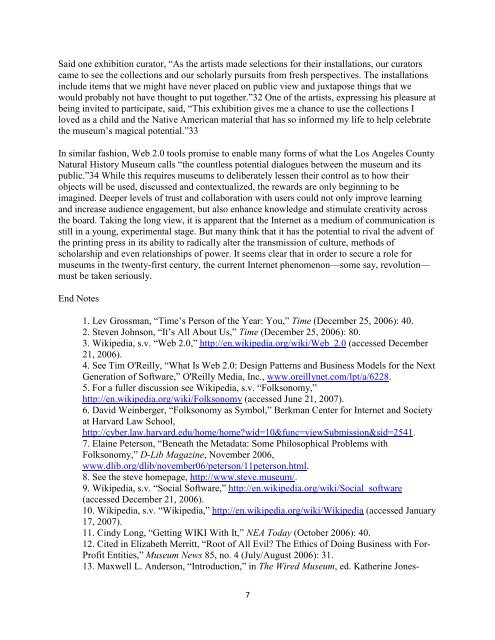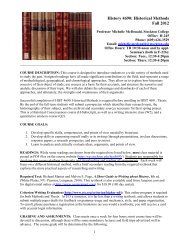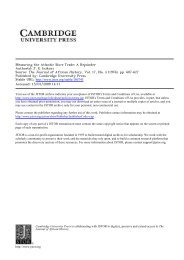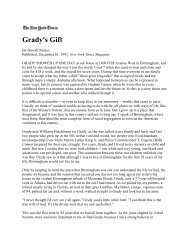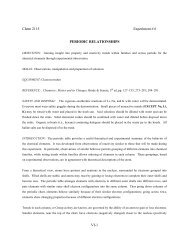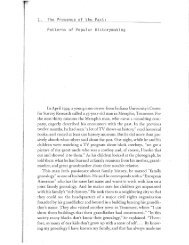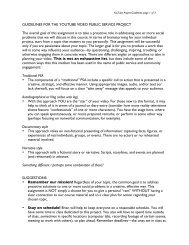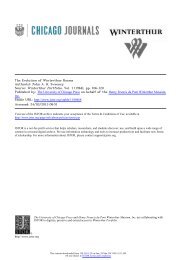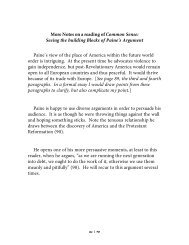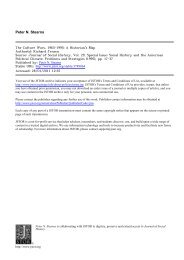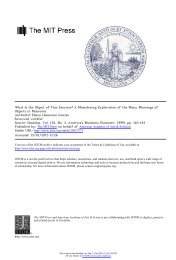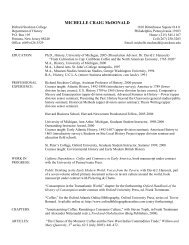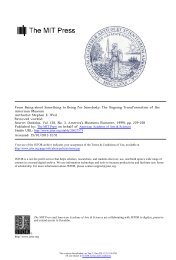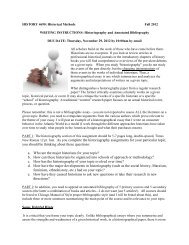can museum allow online users to become participants?
can museum allow online users to become participants?
can museum allow online users to become participants?
Create successful ePaper yourself
Turn your PDF publications into a flip-book with our unique Google optimized e-Paper software.
Said one exhibition cura<strong>to</strong>r, ―As the artists made selections for their installations, our cura<strong>to</strong>rs<br />
came <strong>to</strong> see the collections and our scholarly pursuits from fresh perspectives. The installations<br />
include items that we might have never placed on public view and juxtapose things that we<br />
would probably not have thought <strong>to</strong> put <strong>to</strong>gether.‖32 One of the artists, expressing his pleasure at<br />
being invited <strong>to</strong> participate, said, ―This exhibition gives me a chance <strong>to</strong> use the collections I<br />
loved as a child and the Native Ameri<strong>can</strong> material that has so informed my life <strong>to</strong> help celebrate<br />
the <strong>museum</strong>‘s magical potential.‖33<br />
In similar fashion, Web 2.0 <strong>to</strong>ols promise <strong>to</strong> enable many forms of what the Los Angeles County<br />
Natural His<strong>to</strong>ry Museum calls ―the countless potential dialogues between the <strong>museum</strong> and its<br />
public.‖34 While this requires <strong>museum</strong>s <strong>to</strong> deliberately lessen their control as <strong>to</strong> how their<br />
objects will be used, discussed and contextualized, the rewards are only beginning <strong>to</strong> be<br />
imagined. Deeper levels of trust and collaboration with <strong>users</strong> could not only improve learning<br />
and increase audience engagement, but also enhance knowledge and stimulate creativity across<br />
the board. Taking the long view, it is apparent that the Internet as a medium of communication is<br />
still in a young, experimental stage. But many think that it has the potential <strong>to</strong> rival the advent of<br />
the printing press in its ability <strong>to</strong> radically alter the transmission of culture, methods of<br />
scholarship and even relationships of power. It seems clear that in order <strong>to</strong> secure a role for<br />
<strong>museum</strong>s in the twenty-first century, the current Internet phenomenon—some say, revolution—<br />
must be taken seriously.<br />
End Notes<br />
1. Lev Grossman, ―Time‘s Person of the Year: You,‖ Time (December 25, 2006): 40.<br />
2. Steven Johnson, ―It‘s All About Us,‖ Time (December 25, 2006): 80.<br />
3. Wikipedia, s.v. ―Web 2.0,‖ http://en.wikipedia.org/wiki/Web_2.0 (accessed December<br />
21, 2006).<br />
4. See Tim O'Reilly, ―What Is Web 2.0: Design Patterns and Business Models for the Next<br />
Generation of Software,‖ O'Reilly Media, Inc., www.oreillynet.com/lpt/a/6228.<br />
5. For a fuller discussion see Wikipedia, s.v. ―Folksonomy,‖<br />
http://en.wikipedia.org/wiki/Folksonomy (accessed June 21, 2007).<br />
6. David Weinberger, ―Folksonomy as Symbol,‖ Berkman Center for Internet and Society<br />
at Harvard Law School,<br />
http://cyber.law.harvard.edu/home/home?wid=10&func=viewSubmission&sid=2541.<br />
7. Elaine Peterson, ―Beneath the Metadata: Some Philosophical Problems with<br />
Folksonomy,‖ D-Lib Magazine, November 2006,<br />
www.dlib.org/dlib/november06/peterson/11peterson.html.<br />
8. See the steve homepage, http://www.steve.<strong>museum</strong>/.<br />
9. Wikipedia, s.v. ―Social Software,‖ http://en.wikipedia.org/wiki/Social_software<br />
(accessed December 21, 2006).<br />
10. Wikipedia, s.v. ―Wikipedia,‖ http://en.wikipedia.org/wiki/Wikipedia (accessed January<br />
17, 2007).<br />
11. Cindy Long, ―Getting WIKI With It,‖ NEA Today (Oc<strong>to</strong>ber 2006): 40.<br />
12. Cited in Elizabeth Merritt, ―Root of All Evil? The Ethics of Doing Business with For-<br />
Profit Entities,‖ Museum News 85, no. 4 (July/August 2006): 31.<br />
13. Maxwell L. Anderson, ―Introduction,‖ in The Wired Museum, ed. Katherine Jones-<br />
7


